Franceville, New Hebrides facts for kids
Quick facts for kids
Independent Commune of Franceville
Commune Indépendante de Franceville
|
|||||||||
|---|---|---|---|---|---|---|---|---|---|
| 1889–1890 | |||||||||
|
Flag
|
|||||||||

1905 map of New Hebrides, still showing Franceville as alternative name for Port Vila
|
|||||||||
| Status | Unrecognized state | ||||||||
| Common languages | French, Bislama | ||||||||
| Government | Republic | ||||||||
|
• 1889
|
Ferdinand Chevillard | ||||||||
|
• 1890?
|
R. D. Polk | ||||||||
| Deputy (legislator) | |||||||||
| Historical era | New Imperialism | ||||||||
|
• Established
|
August 9 1889 | ||||||||
|
• Disestablished
|
September 1890 | ||||||||
| Population | |||||||||
|
• 1889
|
540 | ||||||||
|
|||||||||
Franceville was a small, self-declared country that existed for a short time. It was located on Efate island, which is part of present-day Vanuatu. Today, this area is known as Port Vila. Franceville was created in 1889 to give people living there some basic legal rights. This happened during a time when the New Hebrides islands were considered a neutral place.
Contents
What Was Franceville?
Franceville was a small area that tried to govern itself. It was formed because the people living there felt they had no proper government. This was a time when European countries were expanding their influence around the world.
A Neutral Territory
In 1878, two big countries, the United Kingdom and France, agreed that the New Hebrides islands would be a neutral territory. This meant neither country fully owned or controlled the islands. To help protect their citizens living there, they set up a joint naval commission. This commission was like a shared police force.
However, this commission did not have power over the local people's daily lives. It mainly dealt with issues between British and French citizens.
Why Franceville Became Independent
Because there was no clear government, many people living in the New Hebrides were unhappy. French citizens, especially, faced problems. For example, French law said that marriages were only legal if a government official performed them. The closest official was far away in New Caledonia. British law was different and allowed marriages by local religious leaders.
So, on August 9, 1889, Franceville declared itself an independent "commune." A commune is like a small town or district that governs itself. They elected their own mayor and president, Ferdinand-Albert Chevillard. Franceville even had its own flag, which was red, white, and blue with five stars.
A Unique Government
Franceville became one of the first places in history to allow all adults to vote, no matter their gender or race. This is called universal suffrage. However, even though everyone could vote, only white men were allowed to hold government jobs.
At the time, about 500 local people and fewer than 50 white people lived in Franceville. One of its elected leaders was R. D. Polk, who came from Tennessee in the United States. He was also related to a former U.S. president, James K. Polk.
The End of Franceville
The new government of Franceville did not last long. By June 1890, it was reported that Franceville as a self-governing commune had "practically broken up." It was stopped by the larger powers.
Later, in 1906, the old naval commission was replaced. The British and French governments set up a more formal system called a Condominium. This meant they would rule the New Hebrides together.
See also
 In Spanish: Franceville (Nuevas Hébridas) para niños
In Spanish: Franceville (Nuevas Hébridas) para niños


